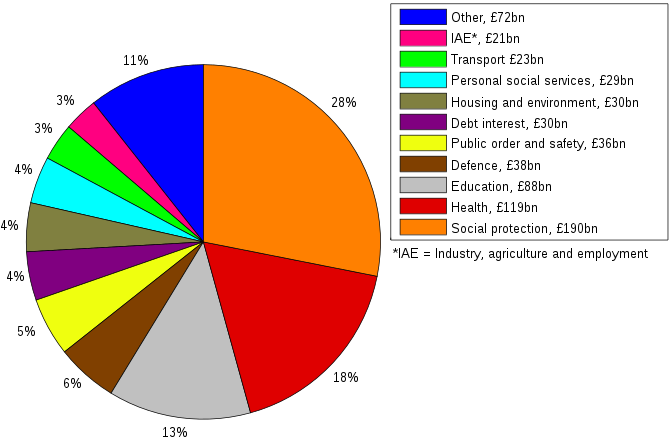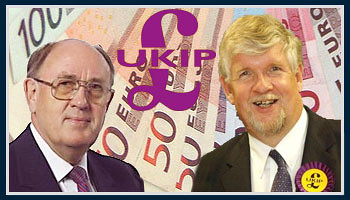 Last week on the BBC’s Question Time, eurosceptic Conservative MEP Daniel Hannan mentioned 84%; UKIP leader Nigel Farrage said it was 75%, the figure most often mentioned by anti-EU types (such as French National Front leader Jean Marie Le Pen or the Libertas Party) is that 80% of our laws come from the EU, while in a speech elsewhere last week, Conservative leader David Cameron said that “Almost half of all the regulations affecting our businesses come from the EU”.
Last week on the BBC’s Question Time, eurosceptic Conservative MEP Daniel Hannan mentioned 84%; UKIP leader Nigel Farrage said it was 75%, the figure most often mentioned by anti-EU types (such as French National Front leader Jean Marie Le Pen or the Libertas Party) is that 80% of our laws come from the EU, while in a speech elsewhere last week, Conservative leader David Cameron said that “Almost half of all the regulations affecting our businesses come from the EU”.
These figures (or, at least, figures in this rough ballpark) are widely accepted, with everyone from universities to charities seeming to accept them at face value.
But are any of them actually true? And which is it? 84%? 80%? 75%? 50%? Or some other figure? Because they can’t ALL be right.
Daniel Hannan: 84% of all laws come from the EU
Let’s take the biggest figure first. If 84% sounds ridiculously high, that’s because it is. Even eurosceptic thinktank Open Europe have dismissed this claim as unrealistic – explaining in detail where the calculation originated.
In short, it comes from a reply by the Parliamentary Undersecretary of the German Parliament, Alfred Hartenbach, given on 29 April 2005 – relating specifically (and exclusively) to Germany, where he stated that from 1998 until 2004, 18,187 EU regulations and 750 EU directives were adopted in Germany. During the same period the German Parliament passed in total 1,195 laws (as well as 3,055 “Rechtsverordnungen” – which are like Primary and Secondary legislation). This was seized on by former German President Roman Herzog and Luder Gurken of the Centrum für Europäische Politik, who used these figures to work out 84% of all German laws originate in Brussels. As Open Europe explains:
750 (directives) + 18,187 (regulations) = 18,917 EU legislative acts
1,195 (Gesetze) + 3,055 (Verordnungen) – 750 (directives) = 3,500 German legislative acts
= 84%.
The 750 directives were substracted as they require seperate implementing laws in Germany (assuming a directive/implementing law ratio of 1:1).
Open Europe goes on to explain why this figure is, at best, misleading. And remember, Open Europe is a eurosceptic thinktank:
to conclude that 4 out 5 laws originate in Brussels is probably a step too far. Germany, for instance, is a federal system, meaning that the individual Lander has substantial powers to legislate autonomously. The many laws adopted on the Lander-level would have to be included in any all laws count, which isn’t the case here. In addition, this count says nothing about the nature of the laws.
It’s also important to keep in mind that the EU’s powers are mainly regulatory, as opposed to budgetary. This means that most issues that relate to spending and taxation (health bills, crime bills, educational reform, pensions, welfare, etc) – the “wallet” issues if you will – are mostly beyond the realm of the EU, but must also be included in any count that includes all laws.
So, the 84% figure is based on a calculation about German laws (and is therefore not directly transferable to Britain, as Hannan and others would like us to believe), and that calculation in any case left out a huge chunk of German legislation, rendering the final figure utterly obsolete.
So the 84% figure can safely be discounted.
UKIP: 75% of all laws come from the EU
Next up, the second highest figure. Where did UKIP get their 75% claim from? Well, handily they provide a video on YouTube which shows it comes from Hans-Gert Pottering, EPP MEP and President of the European Parliament from January 2007 to June 2009:
“If we were not that influential,” the subtitles show Pottering as saying, “then we would not be the legislator of 75% of all laws in Europe.”
But where it suits UKIP’s purpose to interpret this as literally meaning that, EU-wide, 75% of ALL laws stem from the EU, had they included more of Pottering’s speech the context – and therefore the meaning – would have become far more apparent. For what Pottering was actually saying was that the European Parliament (not the EU) legislates on 75% of laws *passed by the European Union*. Not passed by EU member states – just by the EU itself, at EU level. Because the European Parliament has little say in something like 20-25% of EU legislation (something the Lisbon Treaty would rectify, but that’s for another day). German speakers will also be able to confirm that the subtitles on UKIP’s video of Pottering are not 100% accurate.
So the 75% figure does not apply to the percentage of laws in individual member states that stem from the EU, but the percentage of laws that stem from the EU that the European Parliament has a say in. That’s an entirely different kettle of fish – and so the 75% figure can safely be dismissed as based on a (deliberate?) misunderstanding.
David Cameron: “Almost half”
It is worth noting again here that Cameron says “almost half of all regulations affecting our businesses come from the EU”. Some laws may be regulations, but not all regulations are laws, so we need to tread a little more carefully here. Where did Cameron get his figure from? I genuinely have no idea. I can’t track down an original source for it anywhere – though it is a claim made on the website of the Institute of Directors – albeit with the qualification that “estimates vary”, something Cameron neglected to mention.
But what is the real figure? How much say does the EU have in business regulations? Well, handily enough, last month the British Chambers of Commerce produced a report (PDF) investigating precisely this issue, “Worlds Apart: The British and EU Regulatory Systems” – their seventh annual report into the subject, and the fifth comparing the British and EU systems. Their conclusion?
In terms of the number of regulations, the EU this year accounted for only 20%. The reduction from the previous EU level of about 30% is the primary reason for the overall decline in 2007/8.
Hmmm… Only 20%, you say? And the proportion of EU regulations is declining, you say? So where did Cameron get his “almost half” from?
The House of Commons Library’s 9.1% claim
Also on Question Time last week was Europe Minister Caroline Flint, who trotted out the usual defence against the above eurosceptic claims about the EU’s influence that just 9.1% of UK laws stem from the EU. the report in question can be found as a PDF in the depths of the UK Parliament site.
The study was conducted by the (politically independent) House of Commons Library between 1998 and 2005, based on the statutory instruments passed with references to European legislation, because “The vast majority of EC legislation is enacted by statutory instruments under section 2 (2) of the European Communities Act.” It also helpfully breaks these laws down by department – the most affected of which are Defra – which deals with the Common Agricultural and Common Fisheries Policies, so no surprises there – and the Department of Trade and Industry – hardly surprising with the Common Market and all. Both departments saw about 50% of their legislation having some kind of EU origin – which could, via the DTI, be where Cameron got his “almost half” figure from, perhaps?
But is the 9.1% figure accurate? Is just looking at statutory instruments fair, when this means that normal legislation, via parliament itself, can be left out? Open Europe (in the same post where they discussed and dismissed the 84% claim) make four key points:
1) They do not seperate between budgetary and regulatory legislation, therefore comparing apples and oranges.
2) They also compare apples and oranges in another respect: Directives are usually far-reaching measures with a big impact on the economy. SIs, in contrast, can cover a variety of issues, including public administration – for example a road closure or changing arrangements for parish elections.
3) EU Regulations (as opposed to Directives) usually don’t give rise to a new UK law but are directly applicable. Therefore, most EU Regulations are not included in the 9% figure.
4) One Directive does not mean one SI. The Motor Vehicles Regulations in 2007 implemented four different Directives, for instance, making a one-for-one comparison tricky.
On point 1), of course, the EU has no say in the British budget and has no revenue-raising powers, so I’m not sure what they’re trying to say. On point 2) they have a point – but how do you measure the “far-reaching” implications and economic impact of a directive, exactly? On point 3) they also have a point – which might explain why the British Chambers of Commerce have a higher estimate of 20%. Point 4), if we’re hunting down the percentage of British laws that have an EU origin, is irrelevant.
But considering that we’re looking for a percentage of the *number* of laws that stem from the EU, it is worth bearing in mind that Statutory Instruments make up the bulk of all UK legislation, with an average of around 3,500 passed every year for much of the last two decades. In 2008, 3,389 Statutory Instruments were passed, while the UK Statute Law Database lists 2,414 results for the same year. With no study (that I’m aware of) having been conducted on how many of those have an EU origin, it is hard to tell the percentage.
However, with Statutory Instruments making up the bulk of UK legislation, and with most EU legislation brought into force via this method (having already been passed at EU level, there’s generally no need for EU legislation to then be re-enacted at national level, after all), it’s no great leap to suggest that the final percentage wouldn’t be that much higher than 9%. Indeed, Labour MEP Richard Corbett has noted other studies in other EU member states:
6.3 percent according to the Swedish parliament, 12 percent according to the Finnish parliament and between 12 and 19 percent according to the Lithuanian parliament
This would suggest that something in the region of 10-20% would be a fair guess for the UK as well (a range that has the added benefit of being backed up by the British Chambers of Commerce’s recent study of regulations).
Bonus: How much does the EU cost us?
I’ve already discussed the actual costs of EU membership based on the UK’s annual contribution, showing that the net cost is around £4 billion a year. But what about the cost to business and to the economy?
This is, of course, a hugely complex issue. How to estimate the impact of legislation on an entire country’s economy? It’s practically impossible, as without a control sample we can’t tell how beneficial or detrimental any individual piece of legislation may be – let alone the impact of other pieces of legislation that may affect the same general area.
Nonetheless, the more enthusiastic among you may have noted, in the Open Europe piece quoted above, that the same post also gives Open Europe’s own estimate that “72% of the cost of regulation is EU derived”. Is this fair? Well, it’s only an estimate, and I haven’t seen their workings, so it’s hard to tell.
However, let’s return to that British Chambers of Commerce report, also linked above. What do they have to say about the costs of EU regulation?
By value, EU legislation was only responsible for about 0.1% (£1.9m) of regulatory net costs in 2007/8 and virtually all business burdening regulatory activity can be attributed to Whitehall.
Oh… would you look at that?
Conclusion
No one agrees on how much legislation and regulation stems from the EU. The 9.1% figure stated by the House of Commons Library is too low, as it only covers Statutory Instruments, not ALL laws; the higher figures of 84%, 75% and even 50% claimed by the likes of Hannan, Farrage and Cameron are based on miscalculations, misunderstandings, or sources unknown, and often derive from parts of the EU other than just the UK – and so with no hard evidence to support them must be dismissed as either too high or inapplicable to the British situation.
What is the true figure? No one knows. So any claims that state hard and fast percentages should – if we’re being intellectually honest – be treated with equal suspicion.
Not that any of this is likely to change the opinions of those eurosceptics convinced of the malicious and all-pervading influence of the EU on our daily lives, of course. But still. I’ve looked for the evidence, and this is what I’ve tracked down. If you know different, please do let me know – I’m interested in the truth of the situation, as without total transparency, such misinformation, misunderstandings and resentments are only going to grow.
Update, October 2010:
The House of Commons Library has published a new, much more comprehensive study of the percentage of UK laws that originate from the EU. It is freely available as a PDF and despite running to 59 pages I’d strongly recommend reading it in full.
Its conclusion? The true figure is around 15%.
(Rather sweetly it also references this post in the footnotes.)
Update, June 2012: A new German study has revisited this topic, focusing on Germany, the UK, Denmark, France, Austria and Finland. Its onclusions can be found in more detail here. Short version:
UK – 15.5%
Denmark – 14%
Austria – 10.6%
France – between 3% and 26%
Finland – between 1 and 24%
Germany – 39.1%
But note the qualifier: “Do these numbers tell us that the impact of European policy making is by and large minimal, while at the same time there are some interesting variations between member states? No – in fact, these figures can tell us very little about the impact of EU-policy-making.”
If you’re interested in this topic, you may also be interested in these old posts:
– What are the economic costs of the EU?
– UKIP’s £40 million a day claim vs the REAL costs of EU membership
– The dishonesty of the EU debate
– Why legislating and regulating at an EU level is almost always a good thing

 Last week on the BBC’s Question Time, eurosceptic Conservative MEP
Last week on the BBC’s Question Time, eurosceptic Conservative MEP 
 (Alternate post title: Westminster MPs: Not as corrupt as UKIP MEPs…)
(Alternate post title: Westminster MPs: Not as corrupt as UKIP MEPs…) But, lest we forget, UKIP is a party with only one competent elected politician – its articulately populist, platitude-spouting leader Nigel Farrage. It also has a tendency to pick candidates, like MEPs Ashley
But, lest we forget, UKIP is a party with only one competent elected politician – its articulately populist, platitude-spouting leader Nigel Farrage. It also has a tendency to pick candidates, like MEPs Ashley